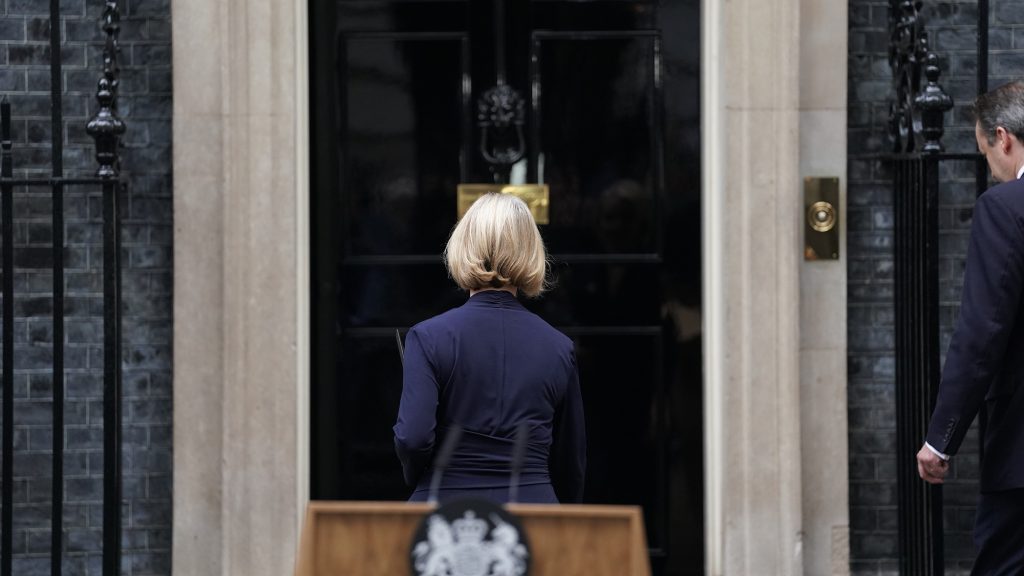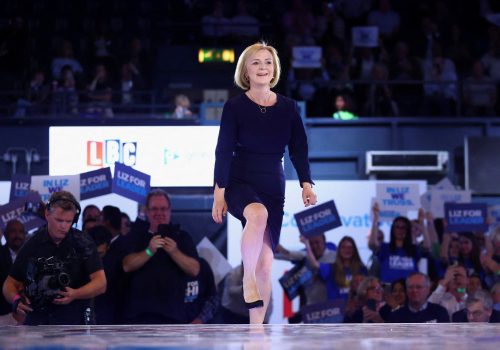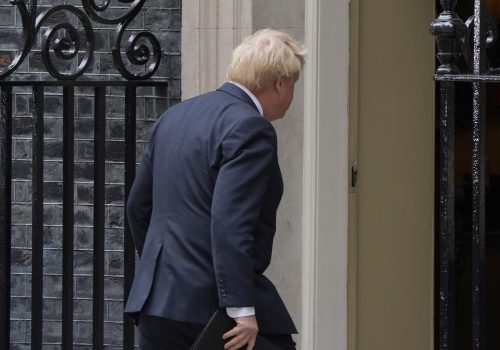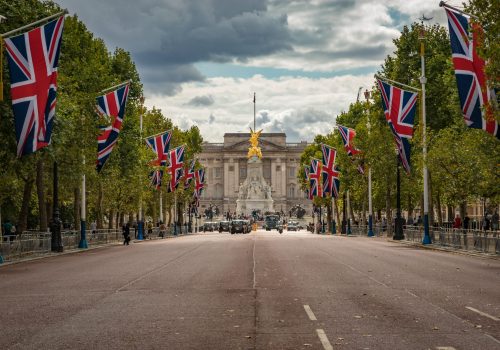The revolving door keeps spinning. UK Prime Minister Liz Truss resigned on Thursday after just forty-four days in office—and 105 days after her predecessor, Boris Johnson, similarly bowed out. Truss’s decision comes after she abandoned her plans for tax cuts that had sent financial markets tumbling and exacerbated Britain’s fiscal crisis. Who is up next to take the helm at 10 Downing Street? Can a new leader calm the markets and steady the country’s volatile politics? Our experts sort through the possible contenders and discuss what this political shuffling means for the United Kingdom and its standing in the world.
Jump to an expert reaction
Ben Judah: One Truss legacy—a Britain more nervous to borrow and more keen to tax
Peter Westmacott: Humiliation for the United Kingdom—and democracy
Frances Burwell: Disunity sends the UK spiraling toward irrelevance as a partner
John M. Roberts: Could Brexit be partially reversed?
Livia Godaert: Expect a rise in nationalist and independence movements
Andrew Marshall: Chaos calls into question the UK’s choice between Europe and the world
James Batchik: Truss’s gains with Europe face setbacks with ongoing dysfunction
One Truss legacy—a Britain more nervous to borrow and more keen to tax
Liz Truss will go down in history as a piece of pub quiz trivia—who was Britain’s shortest-serving prime minister? Considering that the previous holder of the title, George Canning, briefly first minister of King George IV, died in office in 1825, her failure is in fact even more stark. Trussenomics, however, as a phrase, an insult, or a warning in political life—that a British budget is dangerously uncosted and might spook the bond markets—will last a lot longer than her forty-four days in office. Fear of repeating her mistakes will curtail the ambition not only of the next leader of the Conservative Party that succeeds her, but almost certainly the next Labour prime minister, too. Her legacy—rightly or wrongly, given that market moves were not in fact straightforward—will be a Britain more nervous to borrow and more keen to tax.
Of the country’s fifty-six prime ministers since the office is usually said to have begun in 1721 under Lord Walpole (who also was the longest-serving, with a monarchical twenty years to his name), Truss will join Lord North, “who lost America,” and Anthony Eden, who saw then US President Dwight Eisenhower humiliate Britain over the Suez Crisis, as a byword for disaster. A politician who lost control of her message, then her budget, then her party to the point that the Labour opposition was breaking records in the opinion polls with hypothetical vote shares of 54 percent. Every disastrous prime minister becomes a teachable lesson in British politics: Lord North’s lesson is not to get stuck trying to stop the anti-colonial tide by any means possible; Eden’s is not to defy the United States. Trussenomics will be remembered for reminding governments that any electoral coalition risks implosion when the public blames them for sharply rising mortgage costs. Her possible successors may be gleeful today, but this is what will be worrying them as soon as next week—when the Conservative Party is slated to have chosen its latest prime minister.
—Ben Judah is the director of the Europe Center’s Transform Europe Initiative.
Humiliation for the United Kingdom—and democracy
The prime minister had hoped to be able to stay on until the new chancellor of the Exchequer, Jeremy Hunt, issues his medium-term fiscal plan on October 31. A further day of political chaos on Wednesday made that impossible. Liz Truss thus becomes the shortest-serving British prime minister ever.
She survived this long in part because there was no agreed “unity candidate” to succeed her: It has been clear for weeks that neither the country nor the markets would accept two more wasted months of non-government while the Conservatives re-run their leadership contest under the usual rules. So Truss has agreed with party grandees that a successor will be chosen in just a week, probably by a fast-track process requiring all candidates to accept whoever does best in a single round of voting by MPs.
It is not impossible that that person will be Boris Johnson, though the bookmakers’ favorite is Rishi Sunak. The one certainty is that Hunt, who has undone all of Truss’s ill-fated economic strategy since becoming chancellor of the Exchequer, will stay at His Majesty’s Treasury.
The opposition Labour Party is calling for an early general election, on the grounds that whoever governs the country needs a democratic mandate. The Conservative Party, which still has a majority of seventy-one in the House of Commons, is unlikely to agree since the polls overwhelmingly favor Labour.
Meanwhile, the United Kingdom is a source of amusement, disbelief, pity, and schadenfreude abroad. Humiliating for a country that has for so long been a model of functioning democracy.
—Peter Westmacott is a distinguished ambassadorial fellow with the Europe Center and a former British ambassador to the United States, among other countries.
Disunity sends the UK spiraling toward irrelevance as a partner
With the resignation of Liz Truss and the beginning of a new leadership contest, the (dis)United Kingdom continues its devolution towards becoming a less relevant partner for the United States and its European allies.
Since the Brexit referendum of 2016—indeed since Prime Minister David Cameron’s announcement of that referendum in 2013—British politics has been driven by a civil war within the Conservative Party. Those who argued for “taking back” Britain from Europe never laid out a strategy for success as a global economic player but instead maintained that constructing barriers with Britain’s largest economic partner would not have any serious consequences.
That deception has made it impossible for Conservative prime ministers to acknowledge that Brexit has stalled UK economic growth. But until Britain finds a way to move forward economically, its global role will be at risk. A strong defense stance requires economic growth and a strong budget over time, as does an active and global diplomatic role. The defense and rebuilding of Ukraine will require significant contributions from all allies; Britain has been a leader in this, but that cannot last without a stable government and healthy economy.
US President Joe Biden has expressed his thanks to Truss for “her partnership‘’ and has reiterated his faith in the continuation of the US-UK relationship. But in the White House corridors, officials must be wondering how much longer this British drama will continue and what it will mean for Britain’s contributions to meeting the current geopolitical challenges.
—Frances Burwell is a distinguished fellow with the Europe Center and a senior director at McLarty Associates.
Could Brexit be partially reversed?
Liz Truss has resigned, and Britain will have a new prime minister a week from now.
There is no clear favorite for who will take over from someone who may well go down in history as Britain’s worst-ever prime minister.
In just forty-four days, Truss has seen her program for growth destroyed by the reaction of international markets to the fact that she failed either to explain how she would fund her expensive program or to allow it to be scrutinized properly by either the Office for Budget Responsibility or the Bank of England, which handles monetary policy.
In a chaotic premiership, she has sacked two of her most important lieutenants, Chancellor of the Exchequer Kwasi Kwarteng and Home Secretary Suella Braverman.
Her failures contributed directly to massive poll leads, some of more than thirty points, for the opposition Labour Party, whose leader, Sir Keir Starmer, is now calling for an immediate general election—although the current Conservative Party mandate means there is no automatic requirement for an election until January 2025.
The key question over the next few days is how the markets will react. It was the markets that destroyed the Truss administration after her chancellor’s disastrous mini budget was released on September 23. Markets hate instability, and there are still eleven days to go before Kwarteng’s replacement, Jeremy Hunt, is due to deliver his major financial statement. Hunt, who was himself a serious contender to take over from Truss but who has now said he will not stand, has already undone almost all of the Kwarteng mini budget.
These are difficult days for the United Kingdom, which has in a few short weeks lost its reputation for both political and financial stability.
Perhaps the most important immediate issue is how Conservative candidates for the premiership—which include former Chancellor Rishi Sunak and rising star Leader of the House of Commons Penny Mordaunt—conduct themselves during the campaign. There is a lot of support among Conservative MPs for Boris Johnson to return, but that would probably prove incredibly divisive both in the party and in the country at a time when all candidates will be calling for stability and unity. If there is to be a unity candidate, it might be Defence Secretary Ben Wallace, who is one of the few ministers with a consistently respected reputation under different Conservative administrations.
There is little doubt that the biggest reason for the United Kingdom’s current economic disarray is the failure to secure substantial and sustained economic growth in the wake of Brexit. It is now almost two years since the United Kingdom effectively left the European Union (EU), a decision which the respected Institute for Fiscal Studies has said resulted in a 4 percent hit to its GDP.
The big question now is whether politicians from both the Conservative and opposition Labour parties will start to publicly raise the issue of whether the United Kingdom should seriously consider trying to regain access to the single European market, even if they no longer aspire to full EU membership.
So far, for many politicians who voted “remain” in the referendum on European Union membership in 2016, revising or reversing Brexit is the thing politicians don’t want to talk about in public. But as the United Kingdom’s politics and economy have turned head over heels in the last few weeks, maybe this last taboo will be broken.
And if Boris Johnson were to stand—and he is now reported to be taking soundings on that—his role in curtailing the United Kingdom’s relationship with its biggest trading partner is bound to come under close scrutiny.
—John M. Roberts is a nonresident senior fellow with the Global Energy Center and senior partner with energy consultancy Methinks Ltd.
Expect a rise in nationalist and independence movements
Liz Truss was hardly in place long enough to drastically change the United Kingdom’s foreign policy strategy. When the new Conservative prime minister moves into 10 Downing Street on October 28, the United Kingdom’s broad global presence will remain the same. Ukraine will still be a priority and will receive support from the new government. The United Kingdom will still be a committed NATO ally and European security guarantor, a member of the Five Eyes intelligence partnership, and building a greater presence in Asia. Tensions over Northern Ireland and the post-Brexit trade agreements haven’t gone away, and the fight over foreign-aid spending continues. Not to mention, the country is still facing an energy and cost-of-living crisis that will need to be solved and will take up the majority of the new prime minister’s attention. We can expect a new staff, changes to the cabinet, and so on, but the same wheels will keep turning.
How should we understand Truss’s resignation, then? Today is just the latest loop in a years-long political and economic roller coaster that has engulfed the United Kingdom. Since the Conservatives first took power in 2010, the United Kingdom has had four prime ministers, seven chancellors, five home secretaries, and seven foreign secretaries—all amid a global pandemic, multiple financial crashes, and the Brexit referendum, which sits at the center of most of the United Kingdom’s recent chaos. The United Kingdom’s democratic institutions have thankfully held fast, but it is hard to articulate the disorder that this level of turnover creates. This continued political upheaval continues to be the biggest driver of Britain’s declining standing in the world. Europe, the United States, and the transatlantic relationship need the United Kingdom—a stable United Kingdom. Developing long-term strategies and solutions to serious global challenges with partners and allies is difficult when one is not sure who will be in charge and for how long.
Ultimately, alliances and partnerships are built on trust—trust that an ally will answer when called, but also trust from within. This latest political crisis deals a blow to the United Kingdom’s international relationships, but it is also a blow to national self-confidence. The United Kingdom is divided within itself, and this division must be resolved before it can reach its full potential on the world stage. This means political and economic stability, a solution to compounding domestic crises, and some resolution on the state of the union—we can expect a rise in nationalist and independence movements in the coming months.
Just over eighteen months ago (an age in British political time) the United Kingdom published an integrated review, a whole-of-government approach to Britain’s post-Brexit global posture. That government rightly made commitments to prioritize defense in coordination with allies and partners, to build consensus on the greatest global challenges, and to act as a force for good across sectors and policy competencies. But before the United Kingdom can do any of that, it must right the ship at home.
—Livia Godaert is a nonresident fellow at the Europe Center.
Chaos calls into question the UK’s choice between Europe and the world
British ministers and diplomats will want to make sure that the United Kingdom continues to be seen as a dependable ally, and that message is important.
The British defense minister, Ben Wallace, visited Washington this week for discussions believed to be about Ukraine and some of the war’s worst-case scenarios. Wallace is unlikely to change roles in any future government—while he is mentioned as a possible leader, it is more likely that he would remain at the helm at the Ministry of Defence where he and his team have played an important role in supporting Kyiv by providing materiel, training, intelligence, and communications support.
There will inevitably be speculation about an election and a change of government. No election is necessary until January 2025, but the current chaos makes a change of government in the short term a possibility.
In the opposition Labour Party, there is a diversity of opinion about the United Kingdom’s relationship with the United States, but the current leadership is Atlanticist and highly supportive of NATO. The shadow defense minister recently visited Washington and spoke about the importance of meeting NATO obligations. It is possible that a new government would be faced with budget constraints for defense—but that will be the case for any government. A Labour government would have to equally make hard choices about a European focus versus the more global focus that the Conservatives have pushed. Labour would probably avoid approaching the European question for some time. It would get closer to EU partners over foreign policy—but that has started to happen even under the Conservatives.
—Andrew Marshall is senior vice president of engagement for the Atlantic Council.
Truss’s gains with Europe face setbacks with ongoing dysfunction
“No one should or can be happy about the political & economic turmoil in the UK,” tweeted Michel Barnier, the EU’s former lead on Brexit negotiations, following the resignation of Liz Truss. He’s right. Britain’s allies, and especially Europe, stand to gain nothing from Britain’s continued dysfunction.
Before her untimely departure, Truss oversaw genuinely positive developments in London’s relationship with the continent—likely in no small part because her domestic political situation was so unforgiving. Truss reversed course and joined the first meeting of the European Political Community in Prague, where she and French President Emmanuel Macron met separately to declare their friendship and announce a UK-France summit for 2023. More recently, the EU unanimously approved the United Kingdom’s application to join the PESCO project on military mobility. Even on Brexit, Truss’s minister of state for Northern Ireland apologized both to the EU and Ireland, claiming the United Kingdom disrespected “legitimate interests” of Dublin and Brussels. Taken together, these engagements and cooperation between the United Kingdom and Europe marked an uptick in relations with Europe.
The good news is that most of these positive markers won’t go away automatically, but chaos and dysfunction in London won’t help their progress either. Leadership from the top will be required to improve Britain’s relationship with Europe and runs the risk of being put on the back burner in the face of an economic meltdown and an energy crisis. UK-European relations are also especially at risk if a new Tory prime minister decides to channel public anger back across the Channel or even deprioritize relations with Europe.
Britain may be an island, but it isn’t alone. Europe and the United Kingdom need each other, and need focus and political will to forge a productive relationship. Another leadership change in London won’t be helpful in that effort.
—James Batchik is an assistant director at the Europe Center.
Further reading
Mon, Sep 5, 2022
Experts react: The United Kingdom has a new prime minister. What should the world expect from Liz Truss?
Experts react By
How will Truss balance economic challenges at home and deal with allies and foes abroad? Our experts weigh in.
Fri, Jul 8, 2022
Post-Boris Britain will continue to stand with Ukraine against Putin’s war
UkraineAlert By Peter Dickinson
Boris Johnson's resignation has sparked fears in Kyiv over continued UK support but in reality there is little chance of a weakening in British backing for Ukraine in its fight for survival against Vladimir Putin's ongoing invasion.
Fri, Oct 8, 2021
Global Britain: An American review
Issue Brief By
What is happening to Britain in the world? Since 2016, when Brexit began with the United Kingdom’s shock “leave” vote to quit the European Union, the conversation has become almost impossible to have without entering into a fierce and polemical debate surrounding the country’s departure.
Image: Liz Truss, with her husband Hugh O'Leary, walks back into 10 Downing Street, London, after making a statement where she announced her resignation as Prime Minister. Photo via PA/Reuters.



